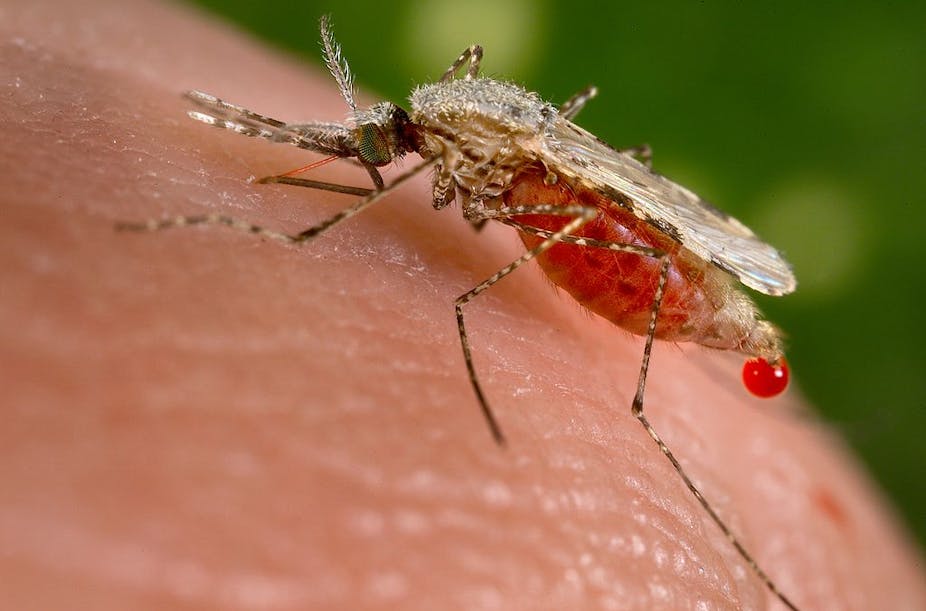Controlling malaria is a war being waged on many fronts. Mosquito nets and coils repel mosquitoes from their human feast; vaccines protect us from the inside and environmental measures clear the stagnant water where mosquitoes like to breed.
But not content with the bedroom, scientists are looking further – to the intimate sex life of the mosquito. In a new study, published in PLoS Biology, researchers at Harvard School of Public Health and the University of Perugia show the importance of a hormone. delivered by the male mosquito to the female during sex. This hormone turns on a switch – a “mating signal” as the authors term it – to tell her to divert resources to producing an egg. Blocking the activation of this switch could be a new way of limiting mosquito populations and therefore the spread of malaria.
Co-authors Flaminia Catteruccia and Francesco Baldini are intimately familiar with the reproductive world of mosquitoes. They worked together on a previous study about the role of proteins found in mosquito semen (delivered in a coagulated mass called the mating plug) in stimulating changes in the bodies and behaviour in females. This time, however, the duo and others focused on the contribution of the male steroid hormone, 20-hydroxy-ecdysone (20-E), found in the mating plug of Anopheles gambiae, the species of mosquito that carry the Plasmodium malaria parasite.
“We looked for it as 20E is not normally associated with male reproduction, so we wanted to understand why Anopheles gambiae males produce and transfer such large quantities of this hormone to the female as we suspected this transfer may have an important reproductive role,” Catteruccia said.
They found that after sex, the 20E hormone interacts with a protein in the female mosquito’s reproductive tract that stimulates egg production. The study also found how it works: the interaction of male hormone and female protein boosts the accumulation of fat in the female’s ovaries, which led to eggs being produced more quickly and in higher numbers. “Virgin females”, on the other hand, rarely develop eggs.
Catteruccia said although their search was by no means comprehensive, they were not aware of a similar interaction like this in the animal kingdom.
Baldini said: “This is the first time, in any insect species, that a male hormone has been shown to directly interact with a female protein and alter the ability of the female to reproduce.”
Their findings could be used to target and reduce mosquito populations in two ways, Catteruccia said, to either inhibit production of the hormone or its interaction with the female. This could be delivered through insecticides that are currently used to curb mosquito populations and through the sterile insect technique – where a huge number of sterile, usually male, insects are released into a population where they compete with natural males and mate with females to reduce the number of insects in the next generation.
“[We could] manipulate males so that they won’t produce and transfer a functional hormone,” she said. “These males could then be released in the field in control strategies such as the sterile insect technique to suppress natural mosquito populations.”
She added: “We could design inhibitors that will prevent females from developing eggs. These inhibitors could be incorporated into insecticide formulations currently used to kill mosquitoes (on mosquito nets or indoor residual sprays).”
“This way, if the insecticide doesn’t kill the mosquito because of resistance, the mosquito still won’t produce eggs and will not transmit insecticide resistance to her progeny. This would increase the lifespan and efficacy of insecticides, our best weapon against malaria and mosquitoes.”
Sanjeev Krishna, Professor of Molecular Parasitology at St George’s, University of London, said resistance to insecticides was a problem and while there are attempts to develop new ones, new ways to tackle mosquito populations and malaria were welcome.
“Mosquito control, in which area control of mosquito reproduction would be an important component, is a proven area of benefit in reducing mortality from malaria through the use of [insecticide] impregnated bed nets,” he said.
“Mosquitoes are becoming resistant to some insecticides, as well as being selected for changes in behaviour that adapt them so that they are less exposed to bed nets. If a new approach can be developed, this would be very helpful in the overall toolkit against malaria. The findings in this study lay the groundwork for a different approach, but there will be a lot more to be done before results can be translated to benefits for malaria control.”
Other work that has looked at biological ways of controlling of Anopheles gambiae (Anopheles is from the Greek meaning “good for nothing”) has included the idea of infecting mosquitoes with the Wolbachia bacterium, which makes them temporarily resistant to the malaria parasite. Females also play a crucial role in this, as the bacterial infection can only be passed between females and their offspring.
As for eradicating mosquitoes, it has been argued that complete riddance of some species that carry the malaria parasite wouldn’t harm ecological systems - especially when compared to the amount of harm caused to humans.

